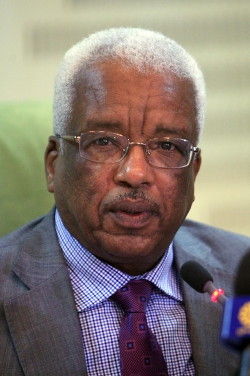Sudan says fuel subsidies a big burden on budget, hints at removing it
October 31, 2011 (KHARTOUM) – The governor of Sudan’s central bank, Mohamed Khair al-Zubeir hinted that the government may soon remove all fuel subsidies saying that the burden is now beyond the country’s means.

“So far we didn’t notice the difference, subsidies were no problem because the country had oil … [but] we cannot pay this anymore,” he added without elaborating on the next steps that might be taken.
Last January the government partially lifted subsidies on petroleum products in anticipation of South Sudan’s imminent secession which became official last July. The south produced the vast majority of the country’s oil before the breakup.
The removal of subsidies which took place earlier this year included gasoline (from 6.5SDG per gallon to 8.5); diesel (from 4.5SDG per gallon to 6.5); cooking gas (from 12SDG to 13); jet fuel (from 4.5SDG per gallon to 6.5).
Any further increases in fuel prices would likely add to the growing public frustration with the soaring costs of living and particularly food prices. Several small demonstrations have been staged over the last few months to protest these problems, in different parts of Sudan.
In addition to this, Sudan is witnessing a sharp shortage in hard currency resulting from loss of oil revenues and slowdown of foreign investments. The government has already banned many imported items to preserve its foreign currency supply.
The Sudanese pound lost a significant amount of its value against the dollar as a result and the black market has flourished despite government warnings.
The Bank of Sudan (BoS) governor suggested that a move to a floating exchange rate may be forthcoming.
“The goal for the exchange rate is to return to the situation in 2006 when prices were determined by demand and offer,” he said.
“We said we want to do this gradually. It would be easy to immediately liberalise the exchange rate but this would create difficulties,” al-Zubeir said.
Last year Sudan temporarily devalued the Sudanese pound to match the black market, hoping to bring more foreign currency into official trade and destroy the parallel market. But the policy appears to have yielded little fruits.
The BoS low Forex reserves are preventing Sudan from reining in the exchange rate markets.
The World Bank figures show that Sudan only had one month worth of Forex reserves in 2009 which is the more recent available number.
Last month. al-Zubair called on his Arab peers to deposit as much as $4 billion into BoS and other Sudanese commercial banks.
In the interview published today al-Zubair said that Qatar, Saudi Arabia, the United Arab Emirates, Algeria and Iran had pledged some support to Sudan but did not elaborate.
(ST)

Logic
Sudan says fuel subsidies a big burden on budget, hints at removing it
The only burden on the North Sudanese economy, is you parasites.
The demographics of Sudanese politics will soon change, lets see what you blood suckers will do then.
Ker.
Sudan says fuel subsidies a big burden on budget, hints at removing it
dear readers the fundamental solution to rising food price in sudan is to make more production, if the country produce enough food of her own is better than to depend outside.
talentboy2
Sudan says fuel subsidies a big burden on budget, hints at removing it
Hello everyone
These brothers of ours in khartuom claimed to be Arab. They dont look like arab at all, look at that guy for example and those you see in north sudan media. they look more just like any other african especially east african, like ethiopian, kenyan Eriterian Somalian Ugandan and off’course their cousin s.Sudanese with different skinned shade, dark, browndark brown.
you name the rest